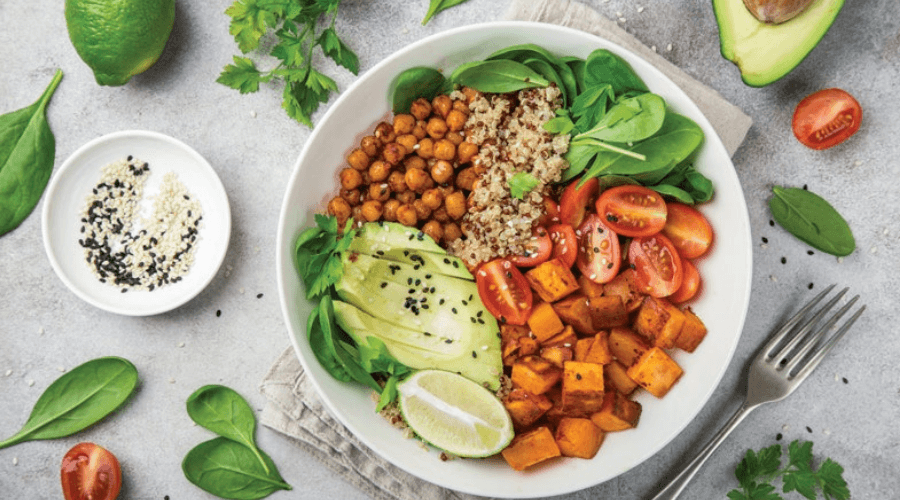In this guide, we’ll explore why high-protein plant-based diets are taking the fitness world by storm, how to build one that meets your goals, and which foods deliver the best results for energy, strength, and recovery.
1. The Rise of Plant-Based Fitness Nutrition
Gone are the days when “plant-based” meant protein deficiency. With more athletes adopting vegan or vegetarian lifestyles, the high-protein plant-based diet has gained recognition for its effectiveness in muscle recovery, performance, and overall health. According to Healthline, a growing number of elite athletes are proving that strength and stamina can thrive on plants alone.
High-profile examples include ultramarathoner Scott Jurek and tennis legend Venus Williams, who both credit plant-based eating for boosting their endurance and recovery. Studies from NCBI show that diets rich in legumes, whole grains, nuts, and seeds provide sufficient amino acids to support muscle synthesis — once thought possible only through animal protein.
Learn more about transitioning to a plant-based lifestyle at Vegan Nutrition Guide (example.com).
2. Why Protein Matters in Plant-Based Eating
Protein is essential for repairing muscles, producing enzymes, and supporting metabolism — making it a cornerstone of fitness nutrition. The challenge with plant-based eating isn’t the lack of protein but ensuring diversity. Unlike most animal products, many plant proteins are incomplete, meaning they lack one or more essential amino acids. However, combining complementary sources solves this easily.
For example, pairing rice with beans or hummus with whole-grain pita creates a complete amino acid profile. According to Mayo Clinic, adults require around 0.8 to 1 gram of protein per kilogram of body weight — and this is easily achievable with a well-planned high-protein plant-based diet.
To optimize recovery, aim to include protein-rich meals after workouts. This ensures muscles rebuild efficiently while reducing soreness and fatigue.
3. Top Protein Sources in a Plant-Based Diet
Building a high-protein plant-based diet starts with understanding which foods offer the highest protein content per serving. Below are some excellent options:
- Lentils: One cup provides 18 grams of protein, plus fiber and iron.
- Chickpeas (Garbanzo Beans): Great for salads, curries, and hummus — 15 grams per cup.
- Quinoa: A complete protein containing all nine essential amino acids.
- Tofu & Tempeh: Derived from soy, these are versatile, protein-dense staples in vegan diets.
- Seitan: Often called “wheat meat,” it contains up to 25 grams of protein per 3 ounces.
- Nuts & Seeds: Almonds, chia, hemp, and flaxseeds provide healthy fats and amino acids.
For more details, check out Medical News Today’s plant protein guide.
4. The Fitness Benefits of a High-Protein Plant-Based Diet
A high-protein plant-based diet offers multiple fitness benefits — from muscle recovery to endurance enhancement. According to research by PubMed, athletes consuming plant-based proteins experience reduced inflammation, quicker recovery times, and improved heart health compared to those on animal-based diets.
Additionally, plants are rich in antioxidants and phytonutrients, which combat oxidative stress — a common issue after intense workouts. Unlike animal fats, plant-based proteins are naturally low in cholesterol and saturated fat, contributing to long-term cardiovascular health. Many fitness trainers now recommend plant-based eating to clients for sustained energy and performance longevity.
5. Myths About Plant-Based Proteins — Debunked
Despite growing evidence, some misconceptions about high-protein plant-based diets persist. Let’s debunk the most common ones:
- Myth #1: Plants Don’t Provide Enough Protein. Reality: Many plant-based foods like lentils, tofu, and quinoa rival animal protein in amino acid composition.
- Myth #2: You Need Supplements to Thrive. While B12 supplementation may be necessary, most nutrients can be obtained naturally through balanced plant-based eating.
- Myth #3: Plant Proteins Are Inferior for Muscle Growth. Studies show similar muscle gain in athletes consuming equivalent protein amounts from plant versus animal sources.
For scientific insights, visit National Institutes of Health.
6. How to Build a High-Protein Plant-Based Meal Plan
Creating a balanced high-protein plant-based diet is easier than it seems. Start with a protein base like lentils, tofu, or tempeh, then add complex carbohydrates and healthy fats for a complete meal. Include leafy greens for vitamins and fiber. For breakfast, consider protein smoothies with soy milk, chia seeds, and oats. Lunch could feature quinoa bowls, while dinner might include lentil curries or black bean tacos.
For those training regularly, aim to consume 20–30 grams of protein per meal. Incorporating snacks like roasted chickpeas or almond butter toast ensures steady energy throughout the day. The Academy of Nutrition and Dietetics recommends spreading protein intake evenly across meals for optimal absorption.
7. Sustainability and Environmental Impact
One of the most compelling arguments for plant-based eating is its environmental benefit. Animal agriculture contributes nearly 15% of global greenhouse gas emissions, according to United Nations Climate Data. In contrast, plant-based diets require fewer natural resources — less water, land, and energy — making them far more sustainable.
By choosing a high-protein plant-based diet, individuals support both personal health and planetary well-being. As more consumers demand ethical, eco-conscious products, businesses in the fitness nutrition industry are also adapting to meet the trend, offering vegan protein powders, energy bars, and supplements sourced sustainably.
8. Real-World Examples of Plant-Based Fitness Success
From professional athletes to everyday gym-goers, many have successfully embraced plant-based eating for better health and performance. Ultramarathoner Rich Roll, Formula One driver Lewis Hamilton, and bodybuilder Nimai Delgado all attribute their endurance and recovery to high-protein plant-based diets.
Even fitness brands are responding. Companies like MyProtein and Orgain now produce high-quality vegan protein supplements for athletes. These real-world examples prove that muscle, strength, and vitality can thrive without animal products.
9. Transitioning to a Plant-Based Lifestyle
Transitioning to a high-protein plant-based diet doesn’t have to be overwhelming. Start by replacing one meal per day with a plant-based alternative. Gradually swap dairy for plant-based milks, and experiment with meat substitutes like tempeh or lentils. Focus on whole foods over processed vegan items for maximum nutritional benefit.
Apps like Cronometer can help track macronutrients, ensuring you’re meeting daily protein goals. Over time, plant-based eating becomes intuitive — leading to sustained energy, better digestion, and a more ethical lifestyle.
Conclusion: The Future of Fitness Is Plant-Powered
The evidence is clear: the high-protein plant-based diet is not a passing trend — it’s the foundation of the future of fitness nutrition. With benefits ranging from improved recovery to environmental sustainability, plant-based eating offers a holistic approach to health and performance. As more people and brands join this movement, the fitness industry will continue to evolve — becoming healthier, more inclusive, and eco-conscious.
So whether you’re lifting weights, training for a marathon, or simply striving for better wellness, remember this: strong bodies can be built with plants. To start your journey, explore Plant-Based Fitness Tips (example.com) and Vegan Protein Recipes (example.com).




